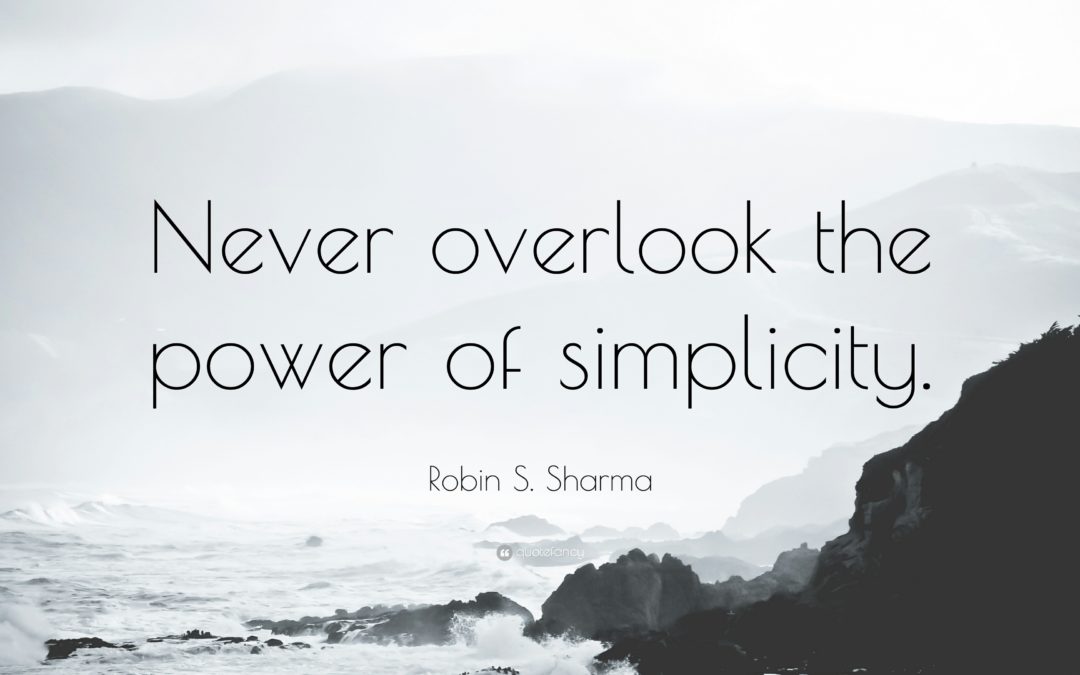
by Julia Felton | May 25, 2016
Recently I have been thinking about the power of focus and simplicity and increasingly I am realising that these are fundamental keys to success. This stark realization was brought about because it became increasingly clear that my clients and prospects didn’t really understand what I could do for them. Some people saw me as a horse trainer, others as a people trainer through horses, others as a fluffy horse gal but curiously very few people saw me as a credible business consultant, mentor and coach who could seriously help them develop and grow their business to the next level. Ouch. That was a tough pill to swallow.
And yet I am all those things. Yes, as many of you know I am passionate about helping leaders and teams develop greater self awareness through partnering with the horses to grow their leadership, teamwork and communication skills. However, what fewer people know about me is that I have created, grown and then sold a multiple million pound business. I’ve seen a business through the entire product life cycle – from inception to disposal – and that a pretty awesome thing to do. I’ve negotiated strategic joint ventures with some global players and done commercial due diligence of potential partners. I’ve designed the software and operating requirements for at least three technology platforms and worked with the IT team to translate my ideas into practical solutions that met the needs of both my clients and my team members. Along the way it also seems like I have become somewhat of an expert on the practical implementation issues of big data. Wow, that’s a lot so its no surprise that people struggle to articulate what I do.
And the challenge of all this is that when your clients can’t articulate what you do, they simply can’t recommend you to others, even if they might want to. So today I have decided to simplify what I do, so that everyone is clear on the benefits of working with me. So quite simply I am a business improvement specialist. Not very sexy but it does what it says on the tin. I help you improve your business. Now that may mean that I help you improve your business systems or processes or it might mean that I help you develop your team members and your leaders. But in whatever way I am serving you – with the vast array of tools in my tool box – the net result is more productivity and profitability, and what business owner wouldn’t want that.
The need for simplicity and clarity in our communication is more important than ever especially due to the overload of information that everyone is literally drowning under. It is being reported that you now have less than 8 secs to make an impression. If people don’t get what you do in this time frame then forget it. So you need to make sure that your online profiles, websites and other social profiles are all aligned and congruent so that every time someone sees you they get the same message.
Making things very simple is actually very complex and this is summed up well by Steve Jobs when he said in May 1998. “That’s been one of my mantras — focus and simplicity. Simple can be harder than complex: You have to work hard to get your thinking clean to make it simple. But it’s worth it in the end because once you get there, you can move mountains.”
What I have come to realise is that I had a limiting belief that if something was simple it was not worth doing. So I’d been making my business about as complicated as I could make it. Having loads of different products, a mass of different lead magnets and different target markets. I’ve barely been able to keep up with what has been happening so I’m sure others haven’t.
Sometimes the hardest thing is to let go of something and yet that is what I will need to do if I am really to simplify things. I’m resisting like crazy and yet I know that unless I create the space through simplification and divestification no new opportunities will be able to emerge.
So what do you need to simplify and focus on in your life in order to help others have clarity and certainty about what you do?
Julia Felton (aka The Business Wrangler) is the founder of Business HorsePower. Business leaders, entrepreneurs and executives hire her to accelerate their business performance by harnessing the energy of their people to work more collaboratively together. By aligning purpose with actions the team achieves exponential results as everyone starts pulling in the same direction.
Julia believes that business is a force for good and through designing purpose-driven businesses that leverage the laws of nature, and the herd, you can create businesses founded on the principles of connection, collaboration and community that make a significant impact in the world.
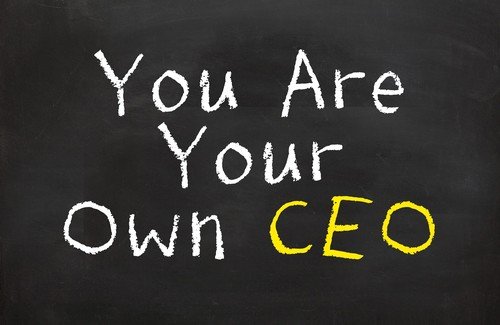
by Julia Felton | May 22, 2016
How many times have you heard an expert say “Stop working in your business and start working on your business”. Or “Start thinking like a CEO and lead your business. Stop acting like a team member”.
Conceptually all business owners I have ever met get that they need to step up and start leading their business if they are to get to the next level of success. The challenge is how to do this. But do this you must because your business won’t grow to the next level unless you the business owner up level your mindset and really start thinking like the CEO of your business.
And let’s just look at the business owner role. Are you really a business owner? According to National Statistics Office there are some 5.2million businesses in the UK, so you would think that all these people were business owners. Wrong. An incredible 75% are to my mind just self-employed experts who do not employ any team members. Sure. they are working for a business enterprise, that they own, but really the way they behave means that they are in effect working for the business, being reactive to all the circumstances that some up. That is not leadership, and that is not how a CEO behaves.
So lets look at the key differences between a self-employed expert, a business owner and a CEO.
Characteristics of a Self Employed Expert
- Highly proficient in their area of expertise (often referred to as being a great technician)
- Their view of what is achievable is limited by what they personally can do
- They have little or no leverage and are stuck trading time for money
- Very reluctant to outsource tasks or build a team
- Often can’t exceed USD250,000 in annual revenue
Characteristics of a Business Owner
- Grudgingly starts accepting they can’t do everything and so begins to strategically outsource tasks
- Adds to the team and starts leveraging other people’s time and expertise
- They often jealously guard some core areas of the business believing that only they can do this
- Usually experiences a rapid growth in both revenue and team
- Revenue typically flat lines between USD1-2 million per annum
Characteristics of a CEO
- Finally accepts they have to replace themselves in the business
- Consciously shifts their primary role to that of strategic relationship builder and rainmaker
- Limits the amount of time that they spend on service delivery to just a few key clients
- Appreciates that their role is to become irrelevant so that the business generates revenue without them
So how do you up level your mindset and start to become the CEO of your business. Here are three things that you can start with:
CEO Mindset #1: Don’t Make Business Decisions based Primarily On Your Personal Preferences
As you step up to become the CEO of your business you need to learn to start making decisions not based on what you personally like but what would be best for the business. For example, choose a business logo and brand colours that resonate with your target audience rather than ones that you really like. Travel to events where your clients will be hanging out, even it is inconvenient for you. Don’t confuse business expenses and investment decisions. The former waste money whereas the latter will over time generate you a return. For example, the decision to invest in a CRM systems won’t feel like an expense when it is delivering you qualified, automated leads every day.
CEO Mindset #2: Don’t Let Outside Factors Impact Your Ability To Take Action
In business there are always a myriad of outside influences that can impact what we do, however CEO’s don’t let outside circumstances take them off track. A classic example of this would be the business owner saying that they will invest in that sponsorship deal as soon as they have secure a new piece of work. Well if you know that sponsorship investment is absolutely the right thing for your business to do and will get you in front of your ideal client. Then surely you should make that investment regardless of whether you secure the new piece of work. In fact just by making the decision to invest and begin hanging out with your ideal client, you may will find that the new piece of work appears as if by magic.
CEO Mindset #3: Don’t Stick Your Head In The Sand and Avoid Addressing Important Issues
As the CEO it is your role to have courageous conversations with your team members, even if it feels uncomfortable. You also need to ensure that key issues in the business are addressed such as having contracts in place, making sure your accounts are completed and other legal obligations. Now I appreciate that some of these things might not fall into your area of expertise but as the CEO it is your responsibility to manage these operations and ensure that your business is compliant at all times. As the CEO you must always be thinking “What is the best for the business”, even if that answer is outside your comfort zone.
You’ll be amazed at what happens when you start stepping up and becoming the CEO of your own business how that has ripple effect on everyone around you. Your new found leadership inspires others to also up level their game and as a consequence business productivity and profitability results.
Julia Felton (aka The Business Wrangler) is the founder of Business HorsePower. Business leaders, entrepreneurs and executives hire her to accelerate their business performance by harnessing the energy of their people to work more collaboratively together. By aligning purpose with actions the team achieves exponential results as everyone starts pulling in the same direction.
Julia believes that business is a force for good and through designing purpose-driven businesses that leverage the laws of nature, and the herd, you can create businesses founded on the principles of connection, collaboration and community that make a significant impact in the world.
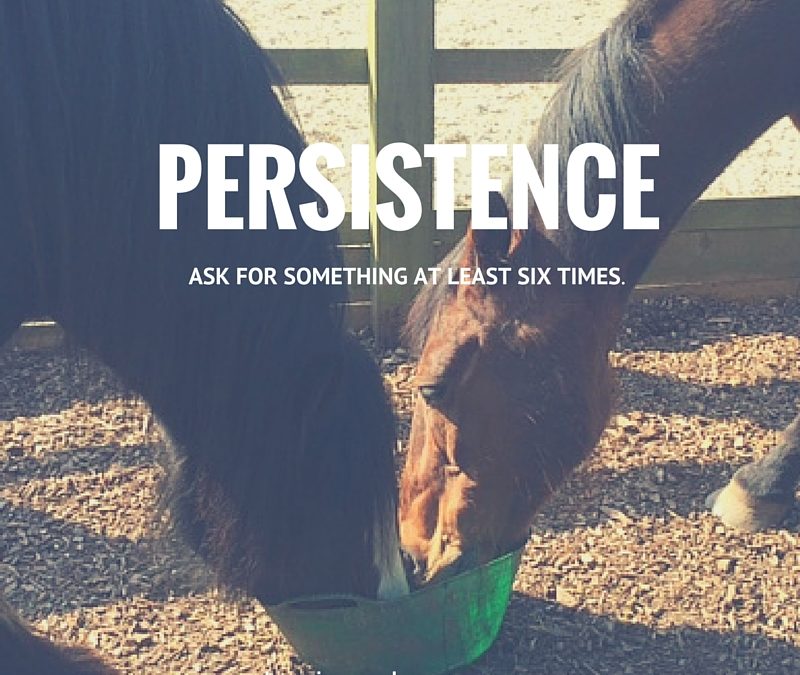
by Julia Felton | May 18, 2016
This week’s daily dose of inspiration is inspired by my pony Thistle and how she behaved this morning. Every day I take the horses breakfast and as usual the ponies – Bracken and Thistle – finished first. (Partly because they are greedy and wolf the food down but also to be fair they do get smaller portions!).
Well after Thistle had finished her breakfast this morning she approached Toby and asked him if she could share his breakfast. Toby’s initial response was NO WAY. He barred his teeth and then moved his hind quarters round and tried to kick her. However, undeterred Thistle kept asking and after some time Toby finally acquiesced and let her breakfast with him.
Watching Thistle’s persistence in asking for what she wanted got me thinking about business and how often we don’t persist in asking for what we want. How often do you ask a potential client for the sale and just because you don’t get an answer you assume that they don’t want your services? If you are like me, I know I am guilty of thinking that. And then you know I simply don’t follow up with that prospect again.
This is a foolhardy strategy and one that means that I am always out seeking new prospects. What if those clients were right there under my nose but I just hadn’t asked them enough times if they needed my services?.
One of the joys and also challenges of the times we live in is the abundance of information we have at our finger tips. This is both a blessing and a curse, as if often means we are drowning in data and information. What if that prospect actually wanted your services but had just missed your email. What a wasted opportunity for both of you.
In a previous blog post Persist as The Money is in the Follow Up I share how 80% of sales are made on the 5th to 12th contact and this reminded me of what my mentor Clinton Swaine told me: “Ask six times for exactly what you want”. Just because you get a No the first time doesn’t means that you will always get a No. Thistle demonstrated this just perfectly this morning. She knew exactly what she wanted and kept asking until she got it.
And increasingly I am finding in business that people rarely respond to a first request. In fact a know a number of people that actually won’t respond to a first request. They know that if the person is serious they will ask again, and if they fail to then they know that either that person wasn’t committed to wanting to work with them. I find that quite a sobering thought!.
So I’d love you to think about the number of times you have failed to ask for what you wanted at least six times. Make a list of all these people and situations and then reach out to these people again. They might just be waiting to hear from you. After all persistence is the key to success. So be tenacious and you might surprised at the results.
So what are you waiting for. Get into action now and let me know in the in the Facebook group how you get on.
Julia Felton (aka The Business Wrangler) is the founder of Business HorsePower. Business leaders, entrepreneurs and executives hire her to accelerate their business performance by harnessing the energy of their people to work more collaboratively together. By aligning purpose with actions the team achieves exponential results as everyone starts pulling in the same direction.
Julia believes that business is a force for good and through designing purpose-driven businesses that leverage the laws of nature, and the herd, you can create businesses founded on the principles of connection, collaboration and community that make a significant impact in the world.
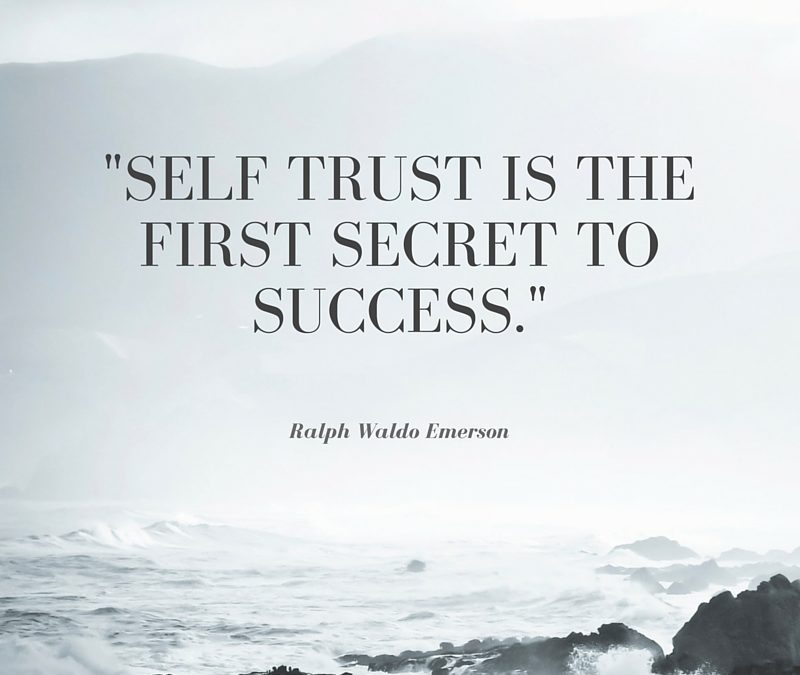
by Julia Felton | May 4, 2016
Recently I have been thinking a lot about trust and how it is a vial ingredient for success in both life and business. In my book The Alchemy Of Change I have two chapters dedicated to trust as it is the glue that holds everything together. Without trust business falters and without self trust we are unlikely to develop our true potential.
In The Speed of Trust, Stephen M..R. Covey identifies fives waves of trust and the first is self-trust. It is all about being credible and developing integrity, intent, capabilities and results that make you believable to both yourself and others. But how do you develop self-trust?
Building trust starts with the small things in life, like doing what you say you will do and keeping appointments with yourself. It might seem obvious but every time you fail to keep an appointment with yourself you are effectively saying that you are not important enough and something else is. In this way you start eroding your self confidence and your self worth.
Research has also shown that a person’s level of self-confidence impacts their performance. This is why Jack Welch felt so strongly that “Building self-confidence in others is a huge part of leadership”. Just think about it. If you don’t have any confidence your own abilities to do the job then you are unlikely to do a great job.
The classic example of this shows up in sales because if the sales person is not confident about the benefits of the service/product they are offering, they will not instill any confidence in the buyer that the product./service will meet their needs. And the end result is that no sale is made. Contrast this with the confident sales person who instinctively knows that their product/service will meet the buyers needs. Every fibre of their being knows this is the right solution for the buyer and invariably that translates into a sale. The buyer also just feels confident that the sales person knows what they are talking about and trusts that they will offer them the right solution.
So how as leaders do we build trust with others? It is by how we act. We need to continually demonstrate our credibility and integrity to others and keep our own standards, thereby acting as a mirror of how we want others to act.
So as you go about your week please think about how you can increase you own levels of self-trust so that you can be credible, inspiring and compelling to those around you and therefore elevate their level of trust in you. Trust me the results in your business will shift immeasurably when you are seen as a trusted adviser to your clients.
Julia Felton (aka The Business Wrangler) is the founder of Business HorsePower. Business leaders, entrepreneurs and executives hire her to accelerate their business performance by harnessing the energy of their people to work more collaboratively together. By aligning purpose with actions the team achieves exponential results as everyone starts pulling in the same direction.
Julia believes that business is a force for good and through designing purpose-driven businesses that leverage the laws of nature, and the herd, you can create businesses founded on the principles of connection, collaboration and community that make a significant impact in the world.
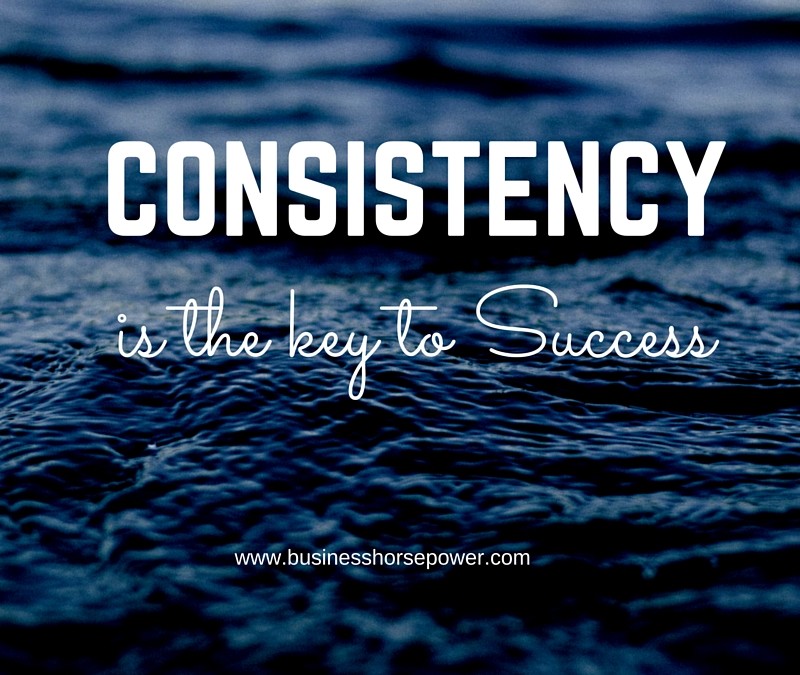
by Julia Felton | Apr 27, 2016
The thought in this week’s Wednesday Wisdom is all the more appropriate as I’m sending this out three hours late!! And this weeks thought is all about the power of consistency, which I believe is one of the keys to business success.
Whatever you want to achieve in life, you won’t become a master unless you demonstrate consistent behaviour and keep training at that discipline. Malcolm Gladwell in the book Outliers says that it takes roughly ten thousand hours of practice to achieve mastery in a field. That requires some consistent behaviour and discipline to show up each and everyday and practice.
The whole concept of consistency has been coming up for me recently with regard to my running. I started the year in great form and was going out on average five days a week. Then I went to South Africa for the best part of three weeks. I didn’t run once and boy was starting again tough when I got back to the UK. And then last week I was in London for a week and yes you guessed it, I didn’t run. This week been really painful trying to get back into the groove.
So what I’ve been learning is that I need to be more disciplined in my life and business and take consistent action each and every day. Because as I have experienced every time I stop it is so much harder to get started again. Consistency helps put structure into your day which in turn actually makes you more productive and efficient. You simply know what you have to get done.
Consistency is particularly important when it comes to marketing your business. You only need about 30 mins a day but making sure you engage in some marketing activities each and everyday helps ensure you have a pipeline of clients who want to work with you. Fail to do this and then you begin suffer from the money roller-coaster, that so many business owners experience.
So I’m going to out myself and apologise to my clients as I have not been following the advice I give you and marketing consistently for 30 mins a day. However, the great news is that now I have a limited number of spaces available for clients who want to make a significant impact in the world and take their business to the next level.
Are you one of these people? If so lets have a complimentary, no obligation chat and if you like what you experience, great I’ll share with you how we can work together.
I only have a limited number of spaces so reserve your place now and let’s see what is possible for you. I look forward to connecting with you.
Have a great rest of the week and an amazing Bank Holiday weekend and don’t forget to do your 30 mins marketing a day!
Julia Felton (aka The Business Wrangler) is the founder of Business HorsePower. Business leaders, entrepreneurs and executives hire her to accelerate their business performance by harnessing the energy of their people to work more collaboratively together. By aligning purpose with actions the team achieves exponential results as everyone starts pulling in the same direction.
Julia believes that business is a force for good and through designing purpose-driven businesses that leverage the laws of nature, and the herd, you can create businesses founded on the principles of connection, collaboration and community that make a significant impact in the world.
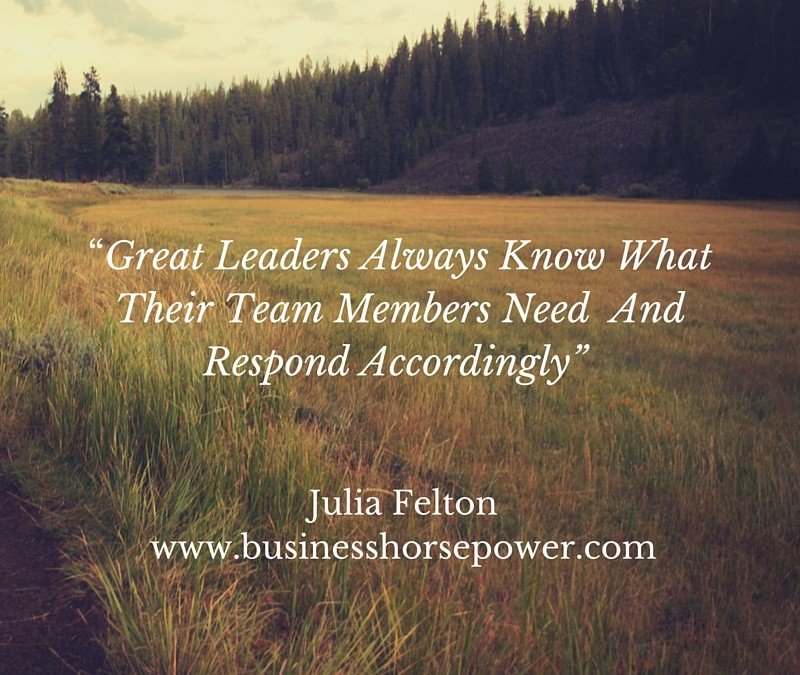
by Julia Felton | Apr 24, 2016
This week I have been reflecting on the fact that great leaders are masters at reading non-verbal communication and knowing exactly what their team members need, and what is going on for them, before they even ask for it. This is because great leaders are really grounded and present and tuned into their surroundings.
At this time of year my horses coats are molting and that makes them really itchy. The best solution for them is to roll around on the floor so they can give themselves a good scratch. Now two of my horses have been wearing rugs all winter so it is more difficult for them to get to scratch and roll. So it is no surprise that on a sunny day at the weekend, when I took their rugs off, they would want to roll. Knowing this I created a great experience for them where they could roll in a deep sandy area. They just loved it. A great example of knowing what your team need even before they ask for it.
As masters of being to read non-verbal communication clues, great leaders also recognise when team members are not “quite right” and functioning at their best. Great leaders read the energy of their team members to know something is amiss. We all have this ability. Just think about a time you went into a room and when you asked how everyone how they were, they replied fine. And yet you intuitively knew that something was up. You could do this as you were tuned into the energy in the room and intuitively something just didn’t feel right.
Just imagine the impact you can make on a team member when you acknowledge this fact and then take steps to help them. It really shows you care, and this simple act can go a long way to foster team engagement and motivation.
So today, please pay attention to what is happening with those around and seek to acknowledge what others need before they have to articulate it. This will bring untold benefits.
Have a great week and please share on the facebook group what happened for you.
Julia Felton (aka The Business Wrangler) is the founder of Business HorsePower. Business leaders, entrepreneurs and executives hire her to accelerate their business performance by harnessing the energy of their people to work more collaboratively together. By aligning purpose with actions the team achieves exponential results as everyone starts pulling in the same direction.
Julia believes that business is a force for good and through designing purpose-driven businesses that leverage the laws of nature, and the herd, you can create businesses founded on the principles of connection, collaboration and community that make a significant impact in the world.
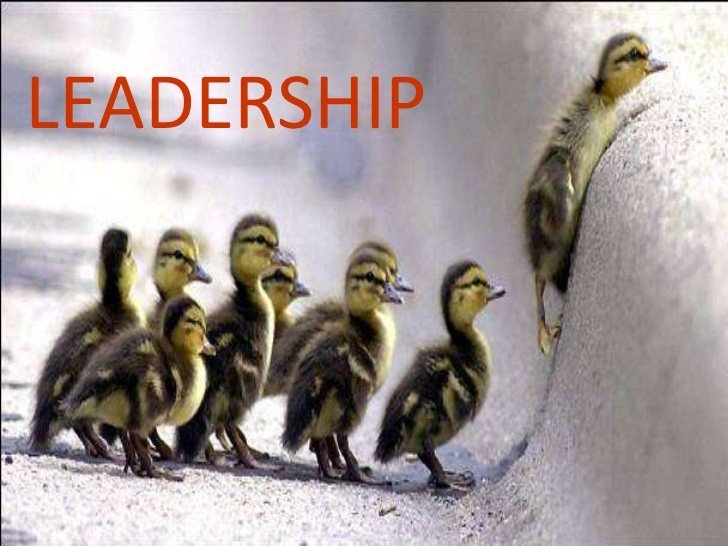
by Julia Felton | Apr 10, 2016
‘Before you are a leader success is all about growing yourself. When you become a leader, success is all about growing others.’ Jack Welch
A recent survey conducted by Emergentics International revealed that Leadership development is the number one priority of HR and organizational development leaders, with 25% of respondents putting it at the top of their priority list. With organizations needing to meet ever-higher financial goals and growth targets, the emphasis on people development provides a window into the way companies are seeing their ability to rise to the top.
The emphasis on talent development and management over competencies like innovation and tactical elements like metrics points to a realization that positive advancements in organizations must start with people. The second highest response for organizational priority was employee engagement, at 22%.
So what is leadership? The Oxford Paperback Dictionary defines a leader as ‘one whose example is followed’. Leadership is that elusive quality that companies are looking for and yet, in my opinion, is so often lacking in organisations. Given the multitude of companies offering leadership training and the circa £3billion spent on external training annually in the UK, how come our companies are not some of the best performing in the world? To my mind, leadership and management are too often confused. We expect managers to lead and yet leadership and management involve completely different skill sets. Indeed, the Peter Principal invariably plays out in organisations. The Peter Principal states that ‘people are promoted to the level of their incompetency’. This is why all too often people get promoted only to fail in their managerial role because what they really need are leadership skills.
Complete leadership starts with the vision and builds relationships with the people that share the vision and who will take on the task of achieving the vision. This differs from management which uses structures, rules and processes in order to control and predict results in a more stable situation. Frank S. Greene notes that ‘the success of management is seen in the industrial empires where people can be used interchangeably and as replaceable parts.’
In order for any business to be successful it needs strong leaders and particularly so in this age of globalisation because whilst an individual might be able to mask their lack of leadership skills in a small organisation, in my experience once they have to manage across multiple locations they will be found out. Great leadership involves developing a blend of vision, relationships and execution and as an organisation expands, the need for the leader to communicate that shared vision to a diverse set of people becomes paramount because unless the vision is shared, the organisation will never meet its goals. It will become like a ship bobbing up and down on the ocean with no clear direction of where it is heading and wonder why the business fails to move forwards.
Horses Always Ask – Who is Leading?
So how can Horse Assisted Coaching help people develop leadership skills? The answer lies in the fact that horses are always looking for a leader. As a prey animal, the horse always has to be aware of imminent danger or else he could end up as someone else’s lunch. This means that a horse always has to be alert to any danger in his surroundings and also be in a position to run away should that danger present itself. To ensure that the horse can survive being a prey animal it has evolved so that its natural behaviour and physiology can keep it as protected as possible. This is why horses have eyes on the side of their head, as it gives them nearly 360 degree vision to see any approaching danger. They are also acutely aware of any changes in their environment, as this could herald the onset of approaching danger. The sense of community and camaraderie they gain from living in herds also helps keep horses safe. I’m sure you’ve heard of the idiom ‘Safety in numbers’ – well, this is the premise that horses work from. The more of them that are together, the more eyes they have looking out for danger and so the safer they feel.
It is because of this desire to stay safe that a horse is always looking for a leader. Can you imagine living by yourself, never being able to rest and relax for fear of being attacked and eaten? This is a tiring place to be and the reason why a horse is willing to let us take up the leadership role with them. However, and this is a really big thing, we must prove to be a leader who can be trusted and who knows what they are doing. If we have no clarity or certainty and don’t evoke a sense of trust from the horse then he will not let us lead him and he will take over the leadership position. You see, unlike people who might be quite polite when their boss is not being a clear, decisive leader, a horse has no option but to act, his life depends on it, whereas in a business we continue to tolerate poor leadership until such time that the leader is removed from that position – ironically often promoted to another position.
Different from humans, horses don’t follow blindly, yet they are looking to be led. They cannot be coerced or influenced, they choose to follow. Horses have survived for thousands of years due to their ability to get along with, and depend upon, one another. They test each other to establish their position within the herd, deferring only to other horses they feel will keep them safe. In a world in which money, control and status are non-existent, horse leaders respond immediately to the thoughts, feelings and sometimes hidden agendas of those around them, and communicate with authority, purpose, authenticity and confidence – all without ‘saying’ a single word. Like some employees, horses can either be willing participants or resentful ‘herd members’, making them ideal partners for teaching self-leadership and teamwork.
Want to learn more about how horses can help you make systemic leadership changes in your organisation, then give us a call or connect with us at connect@businesshorsepower.com
Julia Felton (aka The Business Wrangler) is the founder of Business HorsePower. Business leaders, entrepreneurs and executives hire her to accelerate their business performance by harnessing the energy of their people to work more collaboratively together. By aligning purpose with actions the team achieves exponential results as everyone starts pulling in the same direction.
Julia believes that business is a force for good and through designing purpose-driven businesses that leverage the laws of nature, and the herd, you can create businesses founded on the principles of connection, collaboration and community that make a significant impact in the world.

by Julia Felton | Apr 6, 2016
This week I began an 11 day Fat Loss Challenge with one of my former mentors John Assaraf. I love his work about the neuro-science of business and how the brain impacts our success. The great news is that you can re-programme your brain through a series of entrainment exercises and that is what I am doing with my eating patterns.
I met and then mentored with John back in 2009 when I was living in California and his programme “Having It All” was amazing and transformed my life. I’ll always remember his wise words about how to change anything in your life when he said “Inch By Inch It’s a Cinch”.
You see often when we seek to change habits or achieve goals we often think we have to do it all right now. We have become such an instant gratification society that we have begun to fail to appreciate all the small things around us. And yet it is all those small actions that ultimately help us achieve our goals and dreams.
It is dogged determination and persistence day in day out that effects change. It is the daily decisions that I make about exercise and chocolate that will affect how successful I am on this Fat Loss Challenge, after all I know I can’t lose 6kg overnight!!!
As well as consistent action the other thing to do when setting goals is to make sure they inspire you. John bans the word “diet” as that implies lack and none of us want that. The language we use is so important in helping help us stay motivated and focused, so rather than losing weight John talks about releasing weight. There is something in the language that makes me feel that I am making the choice to do this rather than being forced.
So what small action will you take today to move you towards your goals and dreams – maybe it is reaching out to client, having a courageous conversation with your boss or spouse or in my case exercising and making the choice to eat healthier food.
Julia Felton (aka The Business Wrangler) is the founder of Business HorsePower. Business leaders, entrepreneurs and executives hire her to accelerate their business performance by harnessing the energy of their people to work more collaboratively together. By aligning purpose with actions the team achieves exponential results as everyone starts pulling in the same direction.
Julia believes that business is a force for good and through designing purpose-driven businesses that leverage the laws of nature, and the herd, you can create businesses founded on the principles of connection, collaboration and community that make a significant impact in the world.
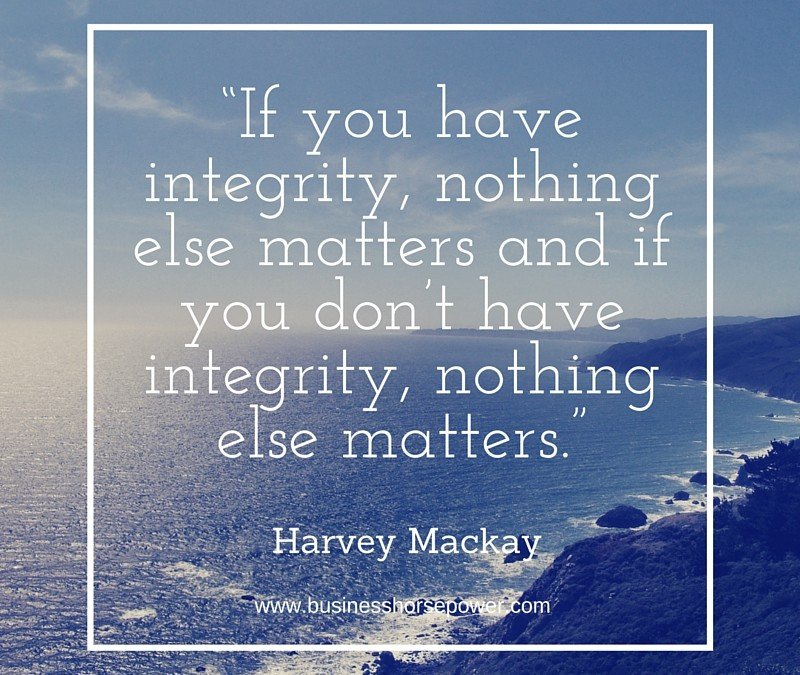
by Julia Felton | Mar 30, 2016
This week I have been thinking a lot about integrity. About what it is and why increasingly I feel that this value is lacking in business. So what is integrity? The dictionary definition is “the quality of being honest and having strong moral principles” and “the state of being whole and undivided”, so how come I am not experiencing this right now? And it seems I am not alone, many of my friends have been commenting on this too recently.
To lead effectively good leaders must demonstrate the right virtues They must demonstrate honesty, humility, authenticity, credibility, courage and accountability. But the most important leadership virtue is integrity. In their book, “The Corporate Mystic Dr. Gay Hendricks and Dr. Kate Ludeman, define integrity the following way, “The mastery of integrity comes down to three things: being authentic with yourself, being authentic with others, and doing the things you have said you would do.”
And perhaps that is the challenge. So often I come across people not walking their talk. They are not being authentic and not demonstrating consistent, honest behaviour. They are misaligned and in-congruent and maybe that is why I struggle to connect with them.
Leadership is influence, but we need leaders who can be trusted and act with integrity. Integrity is a critical factor in the performance of executives and managers. If you are in a leadership role, you have the power to influence people in your organization. When relationships in your organization are built on trust and integrity, you can be sure that your team will be able to reach higher performance. As Stephen R. Covey says, “Personal integrity generates trust and is the basis of many different kinds of deposits.” Lack of integrity can undermine many relationships.
Just as lack of integrity erodes relationships so acting in integrity builds relationships, and in my experience can be the defining difference between business success and failure
So today’s thought is what relationships are you undermining and putting in jeopardy by not being authentic and in integrity?
Julia Felton (aka The Business Wrangler) is the founder of Business HorsePower. Business leaders, entrepreneurs and executives hire her to accelerate their business performance by harnessing the energy of their people to work more collaboratively together. By aligning purpose with actions the team achieves exponential results as everyone starts pulling in the same direction.
Julia believes that business is a force for good and through designing purpose-driven businesses that leverage the laws of nature, and the herd, you can create businesses founded on the principles of connection, collaboration and community that make a significant impact in the world.

by Julia Felton | Mar 27, 2016
This blog is inspired by the work of Jim Rohn and the fact that Spring, the season of sowing and planting has just begun. As a Creator type (Talent Dynamics) it is my favourite time of year. It is the time when I get to explore new ideas and strategise (and prioritise) for the upcoming year. Now I know most people say do this in January but I love to work with the seasons of the year so Spring is my time for plating and initiating all my new projects for the year.
As I’ve been reflecting on what projects (seeds) to plant for this I have been reminded of the first of the basic law of leadership: Whatever you sow, you reap.
In other words, in order to reap rewards (i.e. get success), you must first sow. You must take action and put your ideas into practice otherwise you will never be able to reap. Reaping is reserved for those who sow, who plant. To deserve the harvest, you must plant the seed. Take care of it in the summer. Carefully harvest it and then do wise things with the harvest.
Now, there is a second part to the law which states: If you sow good, you reap good. If you sow bad, you reap bad. This means you cannot sow badly and then hope for good. You can’t plant weeds and hope for flowers.
Here’s something else about the law of sowing and reaping. You don’t reap only what you sow. That’s important to understand. You reap much more than what you sow. If you just reaped what you sow, what’s the exercise for?
It is also important to understand that the law works in both positive and negative, so be careful what you sow. An old prophet once said, “If you sow the wind, you don’t reap wind, you reap a whirlwind.” Therefore you’ve got to be careful sowing the wind, because it might just come back as a whirlwind. That’s on the negative side. But now it also works on the positive side. If you plant a cup of corn, how much do you get back—a cup? No, a bushel for the cup. You get back much more than what you plant. That’s the reason for planting—for the increase.
The final key to the law of sowing and reaping is:. Sometimes it doesn’t work at all. Everybody has to understand. The farmer plants the crop in the spring and takes care of it all summer. He’s an honorable man. Loves his family and is a decent citizen. But the day before he sends the combine harvesters into the field, a hailstorm comes along and beats his crop into the ground. And it’s gone. It’s lost.
So this time it didn’t work. Now what must the farmer do? He’s got to decide whether to do it again or not. “Shall we take another chance the next spring?” I would advise him to do so even though he lost everything in the last harvest because more often than not, you’ll have a harvest if you plant in the spring. There’s no guarantee, but it’s pretty good odds.
And it’s the same in business. We need to carefully select what we want to sow and then we have to nurture the seed (project, programme etc) until it is the right time to harvest. If we pull up the seeds too early and give up on projects before they have had time to get established then we will never reap the benefits of the harvest. And this is what I see a lot of clients doing. They give up on their dreams just before the harvest period. And of course like the analogy goes, even despite all our good work the crop (business or project) might still fail. And what do you do then. I suggest be like the farmer, dust yourself off and have another go. After all the law of probability will probably come into play meaning that the likelihood of failure will be diminished, assuming of course that you learn from your mistakes and don’t replicate them.
Julia Felton (aka The Business Wrangler) is the founder of Business HorsePower. Business leaders, entrepreneurs and executives hire her to accelerate their business performance by harnessing the energy of their people to work more collaboratively together. By aligning purpose with actions the team achieves exponential results as everyone starts pulling in the same direction.
Julia believes that business is a force for good and through designing purpose-driven businesses that leverage the laws of nature, and the herd, you can create businesses founded on the principles of connection, collaboration and community that make a significant impact in the world.
















